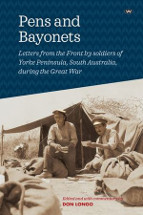Pens and bayonets : letters from the front by soldiers of Yorke Peninsula, South Australia during the Great War by Don Longo

Wakefield Press, 2018. ISBN 9781743056103
(Age: 16+) Recommended for history enthusiasts and students. If I
had to sum up this great book in one word, it would be 'poignant'.
Soldiers who grew up on farms and in towns on the Yorke Peninsula
(and those who moved there for work) wrote letters from the First
World War battlefields, from hospitals and rest areas. These letters
were most commonly written to close family members but many were
sent to newspapers, sporting clubs and social groups - as a means of
informing the district about the exploits of local men but also to
rally support for the cause.
I often struggle with epistolary works which lack the formal
structure of standard non-fiction. These letters however have been
carefully selected to provide a soldier's perspective to the
campaigns and battles in which these local identities were involved.
I'm certain that the editor would have been tormented at having to
limit himself to including only two or three letters per battle or
theatre but in doing so, he has created a highly readable and very
interesting book.
The letters are introduced by short explanations of the historical
background in terms of the First World War's momentous events,
geography, and notable facts. The text from the soldiers'
communications is followed by summaries of the individual's service
experience and details of their lives following the war.
I found this touching and sometimes very sad. Considering that most
of these young men were farmers, miners and manual labourers with
education probably limited to lower secondary level, I was impressed
at their usually high level of literacy. Given the circumstances
under which the letters were written, the spelling and grammar are
superior to contemporary communications. Above all, most writers
were incredibly articulate and this is certainly not limited to
those from the relative minority of officers who were presumably
educated to a higher standard.
It is moving to read the words from men who were exhausted and
traumatised, who clearly needed to confide in their loved ones but
were simultaneously trying to withhold gruesome and frightening
elements whilst attempting to reassure that they would be safe. It
tears at the heart to read in the summaries immediately after the
letter that they were killed a few weeks after writing. In contrast,
I found myself breathing a sigh of relief to learn that laconic
diggers, dodging shot, shrapnel and gas on the Somme or other,
equally dreadful hellhole, returned to farm at Curramulka or open a
shop in Moonta and died at the age of 87.
Sadly, these examples are in the minority and a frightening number
of soldiers who survived the war and returned to South Australia
died in their forties and fifties. Another confronting aspect which
I didn't expect was that so many of these soldiers appeared to spend
significant lengths of time in hospital, not from wounds but from
influenza and presumably water borne diseases.
It was difficult to read this work without picturing the familiar
towns such as Moonta, Ardrossan, Maitland, Minlaton, Port Victoria
and the like. One hundred years later, these are still small, tight
knit communities where individuals are valued and their achievements
celebrated. I felt a profound sympathy for the families and friends
of these soldiers who were so proud of their boys but must have been
sick with trepidation. Sadly, all too often their worst fears came
to pass when instead of receiving a longed for personal letter from
their son or husband, a clinical telegram from the Army or Navy was
delivered to inform them of the death of their loved one.
Rob Welsh